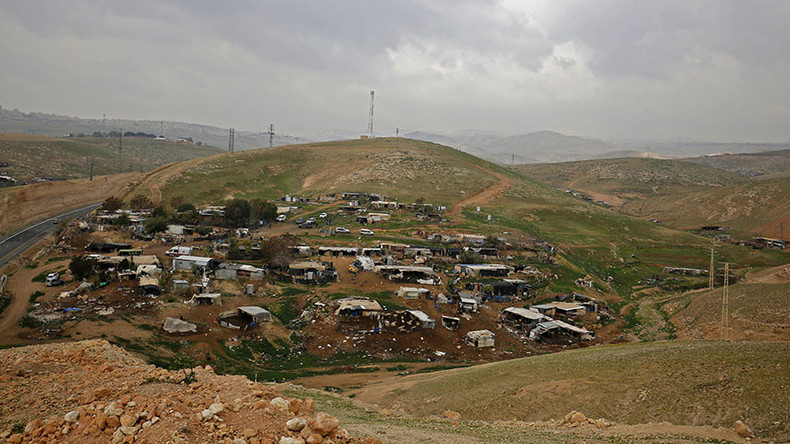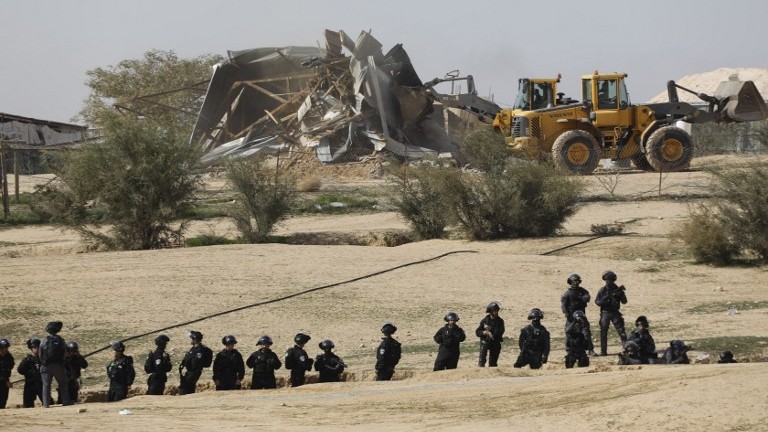Home wreckers

Palestinian Bedouin village of Khan al-Ahmar, in the Israeli-occupied West Bank. Photo by Abbas Momani / AFP
It Happened in Yesha-stan, So Who Gives a Damn?
Raids seizing construction materials in Palestinian outposts in the West Bank are so commonplace they’ve become a non-story. Still, they happen
By Amira Hass, Haaretz Opinion
January 02, 2018
The contract workers in their shiny phosphorescent yellow vests spoke Russian to each other. Border policemen standing by had nothing to do, their hands shoved in their pockets. After all, no one bothered these workers as they loaded a trailer attached to a white pickup truck with a confiscated pile of 60 boards of wood and two doors. A short video clip documented this non-event that took place last Thursday morning, one of many such non-events that take place in Yesha-stan without ruffling our smugness.
It was one more raid by the Civil Administration, carried out for the purpose of nipping one more crime in the bud – the crime of building a shack for some young couple of some children who had outgrown sleeping with their parents in the same tent, shed or hovel.
Contract workers raid Yesha-stan’s construction materials. Photo from B’tselem Youtube
The spokesman for the Coordinator for Government Activities in the Territories (COGAT) responded as follows:
“On Wednesday, materials serving for illegal construction were found in the outpost of Khan al-Ahmar. A unit of inspectors conducted a law enforcement operation on Thursday in order to seize these materials, confiscating them as well as ceramic and wooden panels. The confiscation was conducted according to law and based on operational considerations.”
An “outpost” is the term coined by the settler lobby to describe Palestinian communities that have been in the West Bank since long before the settlements were established there in contravention of international law. This specious definition has percolated into the lexicon of the Civil Administration. The non-event is embedded in the well-known conception: Natural population growth entitles people to housing only if they are Jewish. Not if they’re Palestinian. in Area C, East Jerusalem, the Negev, Galilee or Arab communities in central Israel.
Children in hand-me-down sweat suits milled around, watching, moving away then coming back as they observed the goings-on. Later, when the pickup got stuck for a while as it tried to leave, the children laughed as they watched the attempts to extricate it. Half an hour later the same group, or another one consisting of other inspectors and workers with their bodyguards, arrived at a nearby Bedouin encampment called al-Tabbaneh, confiscating 10 metal sheets and bundles of iron poles.
No adults are seen in the video clip taken by the B’Tselem photographer. They kept their distance from the non-event as it was happening. They know that it is a signal by the Civil Administration and its masters, the settler lobby, that the blade of the state’s guillotine was being honed.
The state is determined to move them from the modest expanse they have been inhabiting for dozens of years. The law is the law, and the law in this democracy for Jews says that a place on which Jewish eyes gaze covetously must be cleared of Arabs. The settlements around the Bedouin community of Khan al-Ahmar don’t consider it sufficient that these other Bedouin communities were expelled in the 1990s for the sake of expanding Ma’aleh Adumim; they don’t make do with the draconian prohibitions on construction imposed on these people. They now want to complete the expulsion.

Israeli policemen stand guard as bulldozers demolish homes in the unrecognized Bedouin village of Umm al-Hiran in the Negev desert, on January 18, 2017. Photo by Menahem Kahana
This Khan al-Ahmar community, the one in whose territory residents built a school made of discarded tyres for the area’s children, became the flagship in the struggle against the forced evacuation. Thus, the efforts of the Civil Administration and neighbouring settlements focus on this community, in order to wipe it out. This is why we are yet again reporting on the non-events that make up the expulsion plans.
High Court or no
New, updated petitions objecting to the evacuation, filed by the community through its long-time attorney Shlomo Lecker, are under review by the High Court of Justice. This hasn’t stopped the Civil Administration from sending unidentified representatives on its behalf to deliver the message: The court ruling is foreordained. You will be evacuated and we’ll make your lives miserable until that happens.
The COGAT spokesman did not respond to the question of why its two representatives, who had arrived at Khan al-Ahmar a day earlier (on Tuesday), did not identify themselves by name, or why they came there at all without coordinating the visit with a community delegate.
Eid Abu Khamis, one of the Bedouin community’s representatives, told Haaretz, “They came and asked if, when they come to remove us, people would get on the buses on their own or whether they would have to be dragged.”
“They asked something else as well,” said Abu Khamis. “They wanted to know why we won’t go to Al Jabel. Every one there gets a plot and water, they said.” (Jabel is the area next to the garbage dump adjacent to the town of Abu Dis, where some Bedouin families were brought at the end of the 1990s and were permitted to build their dwellings. Research by the Bimkom nonprofit group that deals with human rights and planning, as well a study by the UN Relief Works Agency (UNRWA), showed that transferring those families to that location led to a worsening of their social and economic circumstances.)
Abu Khamis told the two unidentified visitors that “we have our lawyer and you know him. You have to talk with him, not with me. Secondly, the courts are reviewing all of this. Have the judges already ruled that you can come here with questions? One of the men answered that they haven’t, but that he was getting ready. I asked him: ‘If you come near a dog kennel where there is a mother and puppies, won’t she bite you if you endanger them or wreck the kennel?’ ‘Yes, she would,’ he said. Then I said, ‘So what would a woman say if you came to wreck her house? Would she thank you?’”

